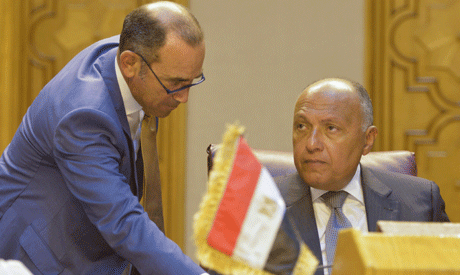
Egyptian Foreign Minister Sameh Shoukry (R) attends the meeting of the Arab Foreign Ministers in Cairo on July 27, 2017, to discuss the simmering unrest surrounding the Al-Aqsa mosque compound in Jerusalem. (AFP)
Egyptian foreign minister Sameh Shoukry said on Thursday that the situation in Jerusalem could escalate if Israel continues to impose illegal security measures at Al-Aqsa Mosque.
Shoukry made the comments in a speech at an urgent meeting of Arab FMs convened to discuss the situation in Jerusalem.
Shoukry said that Egypt has been in contact with the concerned parties to help defuse the tension.
The foreign minister said that Egyptian President Abdel-Fattah has asserted that Israel should guarantee the freedom of the Palestinian people to practice their religion as well as ensure the security of all holy places, especially Al-Aqsa Mosque.
“Israel is provoking Arabs and Muslims around the world with the escalatory and illegal steps it has taken,” Shoukry said, adding that Egypt stresses the importance of Israel abiding by the Geneva Conventions, which prohibit aggressive actions against places of worship.
"The continuation of the Israeli occupation of the Palestinian territories without a clear plan for peace based on the two-state solution will spread extreme frustration among Palestinians and will heavily impact the region," Shoukry said, adding that terrorist organisations will attempt to use this frustration to recruit youth in the Arab region.
Earlier on Thursday, Israeli forces removed all security measures that had been set up by occupation forces at Al-Aqsa Mosque in East Jerusalem.
Shortly after, thousands of Palestinians convened at the mosque, which is considered the third-holiest site in Islam, with clashes erupting between Palestinians and Israeli forces. At least 100 Palestinian were reportedly injured in the clashes.
Last week, Israel closed the mosque to Palestinians for Friday prayers for the first time since Israel occupied Jerusalem in 1967, installing metal detectors and cameras at the entrance to the Haram Al-Sharif Compound following the killing of two Israeli policemen at the site.
Palestinians then boycotted the holy compound for three days in protest against the new security measures, preferring to pray outside the mosque in order not to pass through the metal detectors.
Confrontations and scuffles have erupted between Israeli occupation forces and Palestinians camping outside the holy site, leaving dozens of Palestinians injured by rubber bullets and tear gas.
Short link: